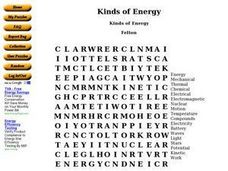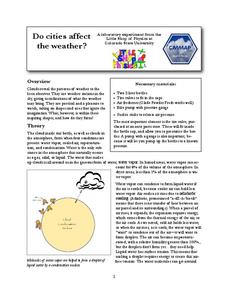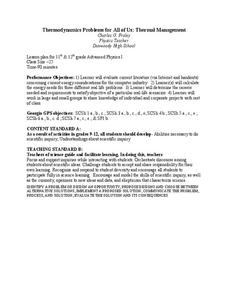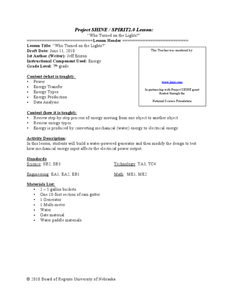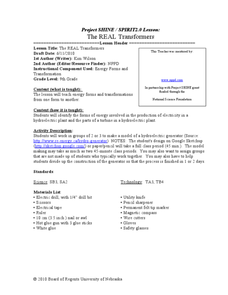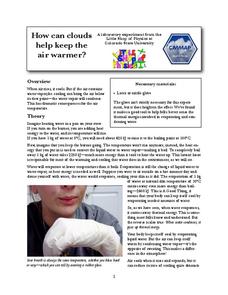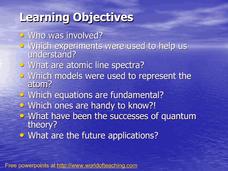Curated OER
Let the Sun Shine!
Students investigate how the sun can be used for energy. They read a handout, discuss the pros and cons of passive solar building design, develop flashcard questions, and identify jobs that can be helped by solar energy.
Science Geek
Basic Thermochemistry
Heat is more than just temperature, as viewers discover throughout a presentation about thermochemistry that emphasizes vocabulary. Definitions include joule, calorie, energy, enthalpy, calorimetry, exothermic and endothermic process,...
Curated OER
Kinds of Energy Word Search
In this energy word search puzzle, students identify types of energy and related terms. They identify 18 words from a given list. An answer sheet is provided.
Curated OER
Ocean Power
Students explore the energy resources of the ocean. In this energy lesson, students participate in 4 activities focused on energy resources from the ocean.
Columbus City Schools
What’s Up with Matter?
Take a "conservative" approach to planning your next unit on mass and matter! What better way to answer "But where did the gas go?" than with a lab designed to promote good report writing, research skills, and detailed observation. The...
Colorado State University
Why Does it Get Colder on a Clear Night than a Cloudy Night?
Clouds are nature's insulator! A lab investigation asks learners to use an infrared thermometer to measure differences in infrared temperatures. They find that pointing the thermometer at a cloud has a much different result than pointing...
Colorado State University
Do Cities Affect the Weather? (Making a Cloud in a Bottle)
The dynamics of a city can have a drastic effect on the weather. A hands-on lesson asks learners to build a model to illustrate how city pollution provides a nucleus for condensation. The greater the pollution, the greater chance for...
Curated OER
Capturing the Sun's Warmth
Students explore the variety of ways to use solar energy. They investigate the thermal energy storage capacities of different test materials to determine which to use in passive solar building design. They explain how passive solar...
Curated OER
Heat Unit
Students define thermal equilibrium. They distinguish between internal energy and heat. Students describe how the quantity of heat that enters or leaves a substance is measured.
Colorado State University
What Is a "Convection Cell"?
Round and round in circles it goes! A hands-on activity has learners recreate a model of a convection cell. They watch as the difference in density of their materials creates a current.
Magic of Physics
Loads Lab
Take a load off! Introduce junior engineers to the effects of load on structural design with an easy-to-use interactive. Individuals apply one of many load options, examine its effects, then learn about the safeguards employed during...
Curated OER
Thermodynamics Problems for All of Us: Thermal Management
Students evaluate current literature on the Internet and in handouts about the energy considerations for the computer industry and calculate energy needs for real life problems. Working in groups, they present the problem they...
Curated OER
Who Turned on the Lights?
Seventh graders discuss how energy is transformed from one form to another. In this physics instructional activity, 7th graders design and build their own hydro generator. They identify the factors that affect its energy production.
Curated OER
The REAL Transformers
Ninth graders create a model of a hydroelectric generator. In this physics lesson, 9th graders discuss how energy can be transformed from one form to another. They make a flow chart for different energy generating plants.
Curated OER
Discovering How a Car Works
Students explain the four stroke process in internal combustion engines. In this physics lesson, students role play this process and present their reenactment in class. They draw and label the diagram of an internal combustion engine.
Curated OER
Solar Power
Learners discover how engineers use solar energy to heat buildings. They investigate the thermal properties of different materials. They evaluate the usefulness of each material.
Colorado State University
How Can Clouds Keep the Air Warmer?
Condensing water warms the air around it. Young scholars consider this concept as they experiment with air temperature around evaporating and condensing water vapor. They simulate the formation of clouds to experience the associated...
SFPOnline
States of Matter Worksheet
Young scientists get to the heart of the matter as they complete this worksheet on the properties of solids, liquids, and gases.
Curated OER
Spectral Lines
Slides and slides of emission spectra bring this topic to light for your physics class! Exited electrons returning to lower energy levels is offered as the cause of emission spectra. In summary, viewers learn that we can determine the...
Curated OER
The Great Heat Escape
Students observe a demonstration on the role of thermal conductivity in heat transfer. For this thermal conductivity lesson, students design and conduct an experiment to compare the thermal conductivity of four substances. Lesson...
Curated OER
Heat Pollution and Communities
Students examine thermal pollution by collecting temperature data on the school's photovoltaic panel. Students collect data for four consecutive days and retrieve information from other classes that meet at different times of the day. ...
Curated OER
Compact Fluorescent Lamp Experiments
Young scholars conduct a series of experiment on incandescent and fluorescent bulbs. In this physics lesson, students explain how they operate. They compare the efficiency and power rating of both bulbs.
Curated OER
Quantum Mechanics
Mostly what you will find here is a history of quantum mechanics. Influential scientists are introduced (along with some of their recorded quotes), the progression of atomic models is reviewed, and finally experssions and equations are...
Curated OER
Atomic Theory
An extremely thorough presentation walks new chemists through the basics of matter. There really isn't a unifying theme, however So many topics are covered: forces, elements, atomic structure, chemical properties, compounds, quarks,...




